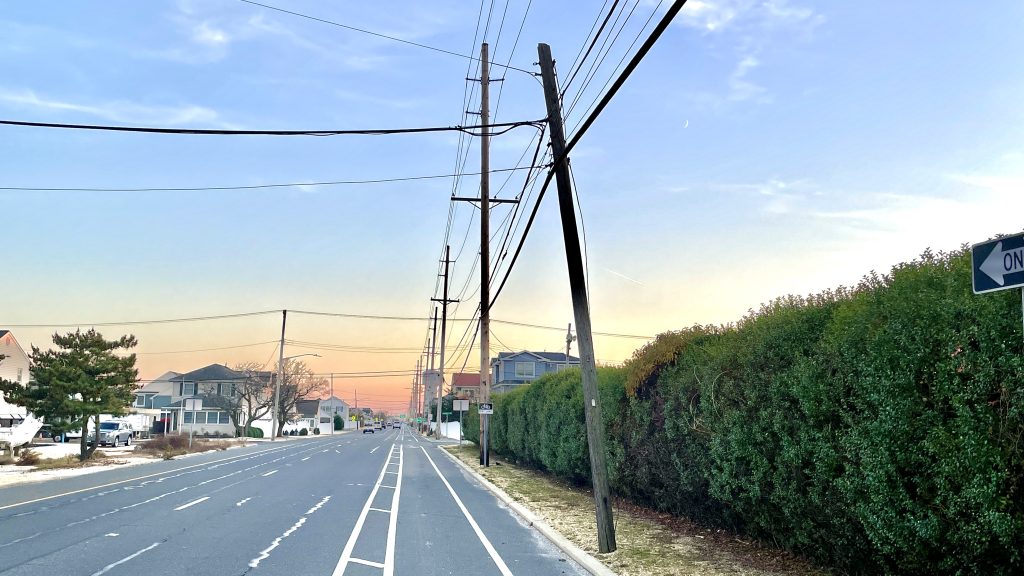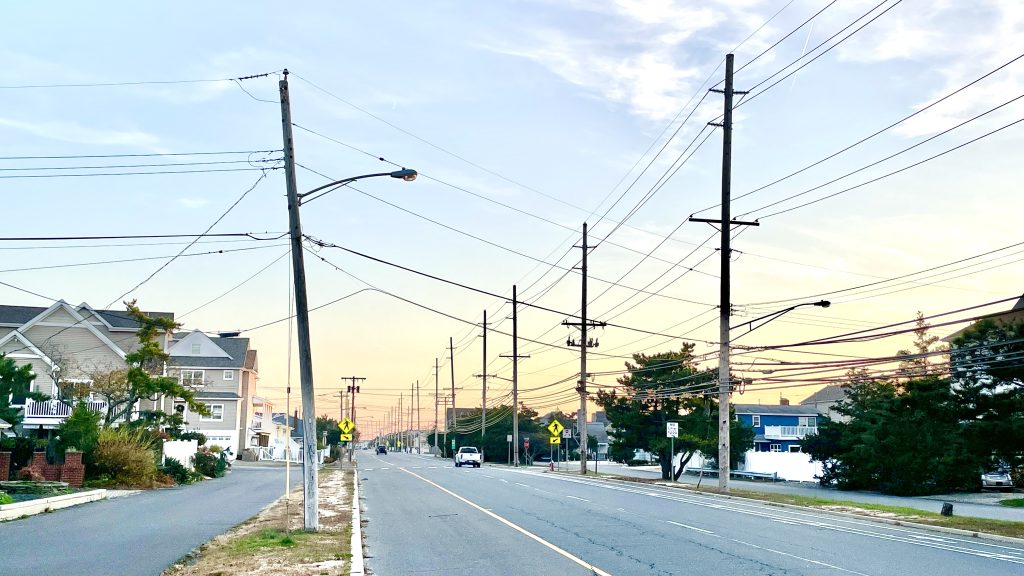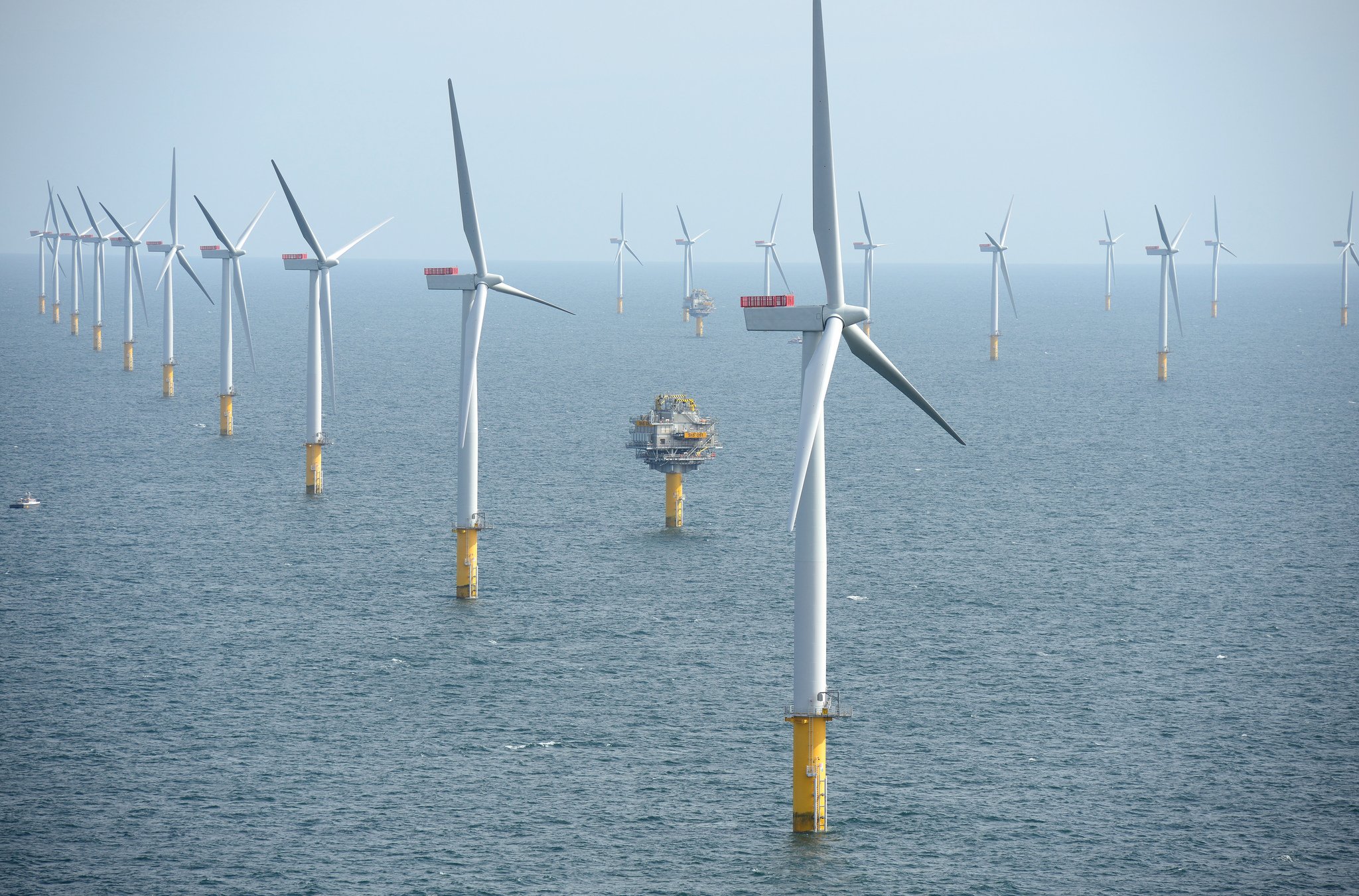Utility poles leaning and wires hanging low due to Ocean County’s sandy soil and years of coastal winds have been a concern of officials going back years, and have taken on a new level of importance after Lavallette officials recently denied Verizon’s bid to install seven additional small-cell wireless towers, at least partially due to concerns that more than 500-pounds of weight would be added to poles already leaning from the elements.
Utility poles, contrary to the belief of many residents, are generally not owned or installed by municipal governments. With the exception of a select few towns across the state that run their own electrical utilities – and even there in some cases – the poles are usually owned by either Verizon, dating to its legacy with the Bell system, or JCP&L, a regional utility now owned by national provider FirstEnergy. Occasionally, a pole is owned by a cable operator. But government officials are the ones who field calls about leaning poles, and though the message is passed on to the owner, municipal governments have little if any jurisdiction over the actual problem.
While it is easy to report system outages, Ocean County officials have sought for years to establish a streamlined way for residents, visitors or even passersby to report leaving poles or low-hanging wires without having to contact a call center with prompts to enter account information. The county’s Board of Commissioners said last week that they have made progress on the issue.
Outgoing commissioner Joseph Vicari, in a meeting with officials from the state Board of Public Utilities, addressed his call for a public 800 hotline, which residents and government agencies can use to quickly report low wires and bent telephone poles.
The BPU does already operate two hotlines – one for strictly cable television complaints and a second for all other utilities – but have now pledged that either line will accept complaints about exterior cables and utility poles. The call with BPU staff was the precursor of a virtual meeting between Vicari and BPU President Christine Guhl-Sadovy slated for next month.
“I was very pleased with the response from the Board of Public Utilities,” Vicari said following the 30-minute session, which also featured representatives from the county’s professional staff. “We want to work together with the BPU to solve this potentially dangerous problem.”
Vicari said he has personally witnessed low-hanging utility cables throughout the county.
“Some are so low that they pose a threat to motorists, bicyclists and even pedestrians,” he said.
Likewise, the issue was discussed in detail at recent hearings over Verizon’s bid to place, in some cases, more than 500-pounds of telecommunications equipment on poles belonging to the Lavallette electrical utility that are already leaning and, in some cases, held in place by guide wires. While Verizon has not directly asked taxpayers to build new poles, the company’s answer often been to leave the leaning poles in place while digging holes for additional poles.
Lavallette Councilwoman Joanne Filippone said the problem is particularly apparent in the barrier island portions of the county, where northeast winds and sandy soil have provided a defined tilt to many poles, including some installed along Route 35, where accidents have resulted in multiple cars striking poles. There are concerns as to whether a pole that is leaning would be more susceptible to becoming fully overturned in a crash.
“The integrity of these poles is questionable,” is Filippone, after a Verizon representative testified at a hearing that the safety of placing 5G and 4G nodes on the poles is partially calculated using assumptions based on other data. “You have not proven to me that this usage is documented.”
Vicari, during his meeting with BPU officials, brought up incidents on the mainland as well, where the soil remains sandy even miles away from the beach. He cited an incident in Lakewood Township earlier this year where a truck became entangled in low-hanging telecommunications cables and ripped the wires off of several nearby poles.
Vicari said his efforts to address the problem directly with utility companies such as Comcast and Verizon have been met with little success.
“This is a major health and safety issue, but one company always blames the other and claims it’s not their wires,” he said. “I can never get a straight answer.”
The BPU officials said they will now begin directly contacting the offending utilities if a complaint is forwarded to their 800 number. (Officials reminded residents that actively downed poles or live wires should be reported to 911.)
Vicari also used Thursday’s meeting to reiterate his call for utilities to inspect their poles at least twice a year. He first made that request with BPU Executive Director Bob Brabston during a meeting last April.
BPU officials have said they currently lack the legal authority to force telecommunication companies to complete such inspections. However, county officials said the board is working with state lawmakers to formulate legislation that would increase the BPU’s authority, especially over cable television providers.
“These cable companies use our county roads for their poles and cables,” Vicari said. “They are making a decent profit and need to give some back. They need to maintain their infrastructure.”
Vicari, a former principal and schools superintendent, also recalled a dangerously-leaning pole in Brick Township that was low enough to pose a danger to school buses.
“It was incredibly difficult to force the utility to respond and fix the pole,” he said. “I had to work with the mayor’s office to finally get a response.”
Vicari and BPU officials jointly encouraged the public to report a problem with a pole or low-hanging cable by contacting the board’s 800 number 800-624-0241 for all utilities or 800-624-0331 for cable television complaints. If a resident is not sure of the type of wire or pole, they may call either number.

Advertisement

Ortley Beach & North Beaches
Popular Island Donut Shop Aims to Nearly Double in Size

Seaside Heights & Seaside Park
Building Boom: Slew of New Subdivisions Proposed in Seaside Heights for 2025

Police, Fire & Courts
Ocean County Sheriff Establishes Drone Command Center in Seaside Heights Amid New Video










